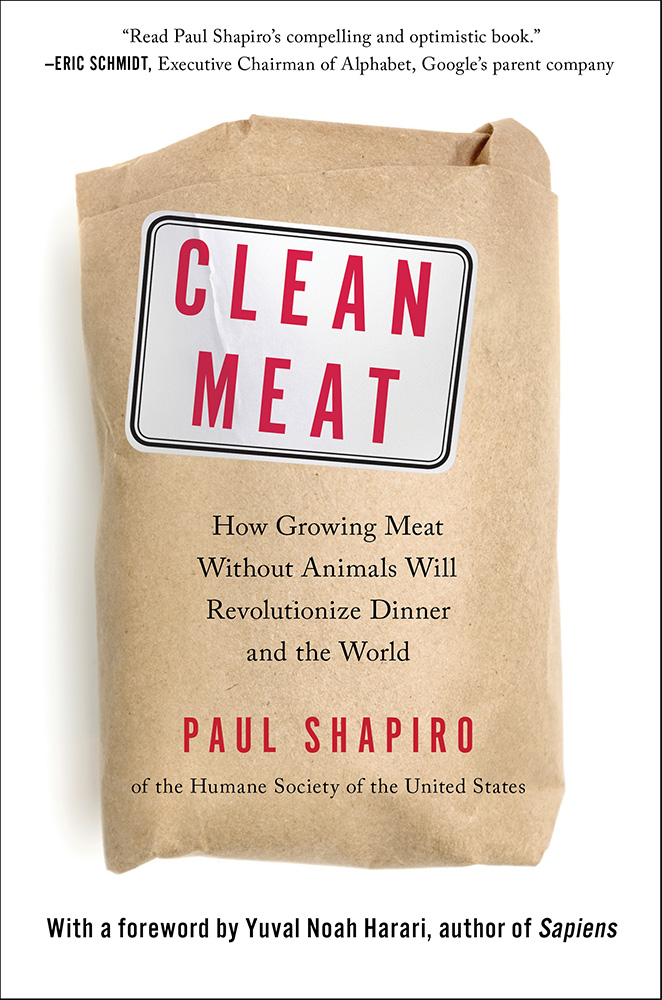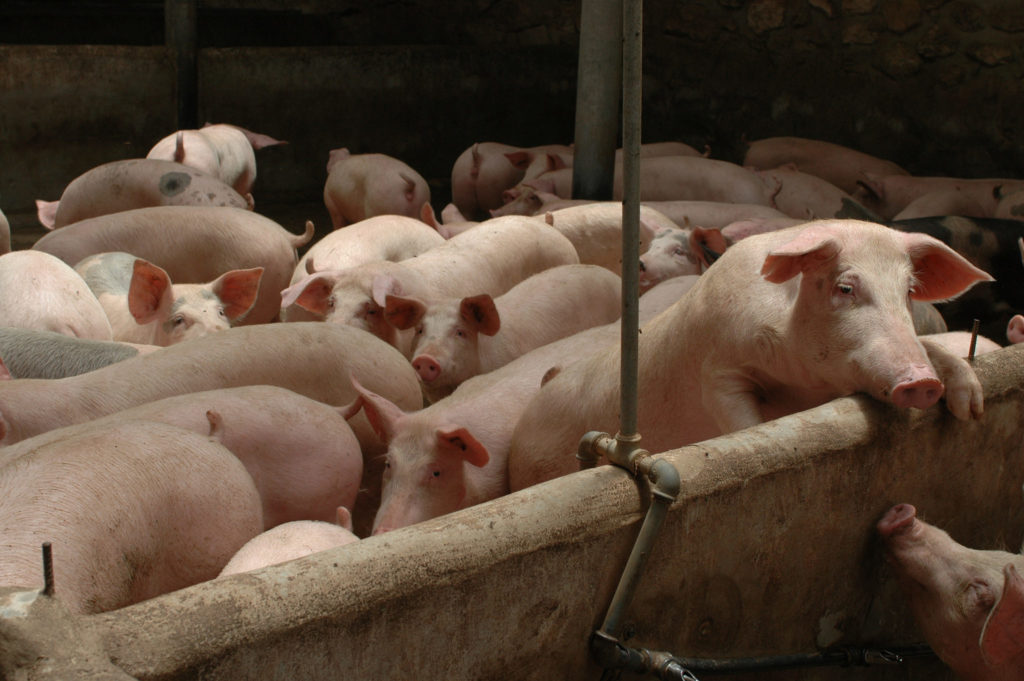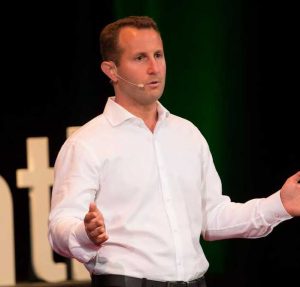I have known Paul Shapiro since he ran Compassion Over Killing in Washington DC, together with his wonderful three legged dog, George. From that position, Paul went on to be a Humane Society of the United States spokesperson and vice president for thirteen years. In January 2018, Paul came out with his first book: Clean Meat. How Growing Meat without Animals will Revolutionize Dinner and the World. In it, Paul chronicles some of the key people, companies, and technologies behind clean meat, or the process of creating animal products directly from animal cells, without live animals. Paul provides the reader with a fascinating inside view of the startups that have been popping up in our social media feeds in the last few years: companies like Memphis Meats, Hampton Creek, Modern Meadow, Clara Foods, Mosa Meats, Geltor, or Perfect Day, who are all hurrying to bring products to market that might just mean the beginning of the end of animal consumption. I talked with Paul about his hopes for clean meat, and asked for his answers to some common objections to the idea of eating meat without animals.
Vegan Strategist: Paul, your book got me even more excited about the possibilities of clean meat (not to mention clean milk and clean eggs). First of all: what are you most excited about?
Paul Shapiro: I’m excited about it all, but, in all honesty, what would excite me the most would be a greater focus (in both plant-based meats and clean meats) on poultry and fish. The success of alternative milks and burgers is stellar, but even 100% displacement of those categories would affect less than 1% of farmed animals in the United States. Statistically speaking, virtually all farmed animals are birds and fishes, so we need more replacement products for them. Fortunately, many of these startups are working on clean chicken, while Finless Foods is developing clean fish, too.
VS: What in your opinion is the most critical factor for clean meat to succeed?
PS: Not enough people buying this book! Just kidding. Seriously, there are key hurdles, from consumer acceptance to government regulation to technological barriers that could hinder the success of these start-ups. That said, every one of these companies is optimistic about overcoming such hurdles, and I outline why they feel that way in the book.
VS: One of these technological barriers is the serum that is used to make the animal cells grow. Traditionally, this has been bovine serum. How are the alternatives coming along?
PS: What we call acellular ag companies (those making milk, egg whites, leather, and gelatin) don’t need any bovine serum (or any other animal ingredients) at all. But the meat companies still use bovine serum for some meats, though not for others. They all know they can’t commercialize their products with that serum, both for financial and ethical reasons. The good news is that they’ve found non-animal alternatives to bovine serum that work (in fact, Memphis Meats’ Nick Genovese even published his serum-free recipe already), but the key is to find the most economical alternatives that will still cause the cells to grow into muscle quickly.
VS: Assuming we can get past the technological hurdles: how easy or hard will it be to get governmental approval to bring these products to market?
PS: That depends on the country and on the product. The path for the acellular ag companies seems a bit clearer, since there are already similar products on the market now. For instance, the rennet in nearly all hard cheeses sold in the US is produced through the same kind of synthetic biology which companies like Perfect Day, Geltor, and Clara Foods are using.
VS: There are some really smart people, like Pat Brown of Impossible Foods, who still think clean meat is an unfeasible and stupid idea. The organization Givewell, as late as 2015, was not recommending investing in or donating to clean meat. Could they be right?
PS: Sure, they could be right. I, of course, hope they’re not, and I also look at what experts in the meat industry think. Cargill has already invested in Memphis Meats. A major German poultry company just invested in SuperMeat. I presume they know what they’re doing. But there’s nothing inevitable or self-executing about the success of clean meat.
VS: Some people – vegans especially – will say that we already have enough plant-based alternatives, which are getting better and better, and that we don’t have any need for clean meat.
PS: If plant-based meats explode in popularity and make clean meat unnecessary, all of the clean meat companies will be thrilled, as would I. I love plant-based meats and tout them all the time. But many people profess to be wedded to actual animal meat. For them, clean meat could be a solution.
The problem of factory farming is just so severe that you want multiple solutions. Just as with the problem of fossil fuels, you don’t want just one alternative, like wind. You also want solar, geothermal, and more. Similarly, plant-based meats are a great solution to the factory farming problem, but you also want other alternatives, including clean meat, and, of course, whole foods plant-based diets, too.
 VS: There seems to be a big food trend in the direction of more authentic, more simple, more artisanal food. That doesn’t seem very compatible with clean meat, at first sight.
VS: There seems to be a big food trend in the direction of more authentic, more simple, more artisanal food. That doesn’t seem very compatible with clean meat, at first sight.
PS: The key isn’t to get people who like “natural foods” to eat clean meat; it’s to get mainstream meat-eaters (which is nearly everyone) to eat it. And really, the current way we produce meat is so unnatural that growing it seems like a naturally preferable option. I might also point out how technology has helped us on a lot of other food sustainability issues. Take vanilla as one example: only about 1% of vanilla that we eat is “natural” vanilla, which is grown in rainforests. The rest is produced synthetically, allowing us to have the same vanilla taste and scent we crave for much lower costs.
VS: What would you tell vegans who are critical of clean meat?
PS: Well, clean meat is meant, in the first place, for mainstream meat-eaters, meaning nearly everyone. Some vegans will be fine eating it, but the surveys show that the less meat you eat now, the less interest you have in eating clean meat.
No one argues that clean meat is a panacea or that it addresses every single concern about meat. It is quite plausible though that it may spare billions of animals from torture and slaughter. All that said, sometimes as vegans we delude ourselves into thinking that the foods we eat don’t cause any animal suffering. For those who think that, I’d recommend becoming more familiar with commercial agriculture practices, including for the plant-based foods we vegans love.
VS: It seems that in the evolution towards a better world for animals, business and entrepreneurship are getting more and more important compared to activism/advocacy. What’s your take on that?
PS: I totally agree, and recommend this good essay by my friend Seth Goldman, executive chairman of Beyond Meat, on the topic. This is a big reason I wrote the book and am now moving away from conventional animal advocacy and toward food tech as a way to help animals. The animal advocacy movement can do a lot of good, yet I’ve increasingly come to the view that food technology is desperately needed to greatly accelerate the shift away from the factory farming of animals. Horses weren’t liberated from labor by humane sentiment; Henry Ford liberated them. Whales weren’t freed from harpoons by humane sentiment; kerosene helped render whale oil obsolete. Will clean meat and plant-based meats help do the same for farm animals? These questions are the driving factors for me to move my career more into the food tech space.
VS: And you’re not the only one. The stories of the “business activists” in your book are fascinating and inspiring.
PS: Yes. And it’s helpful to recall that these people are just people. They’re mere mortals like the rest of us. Many of them are young idealists who haven’t come to believe yet that they can’t change the world. And, as the saying goes, those who complain that they can’t change the world should get out of the way of those who are doing it.
VS: How do you feel about big meat companies getting involved in this?
PS: The faster meat companies become the purveyors of plant-based meats and clean meats, the faster animals will win. Fortunately, it’s already starting to happen.
VS: What would you say to people who bring up anti-capitalist arguments?
PS: I hear that argument and respect those who make it. But if animals must wait until the end of capitalism to be freed from factory farms, they’re going to be waiting a long time.

Confined pigs on a pig farm. “If animals must wait until the end of capitalism to be freed from factory farms, they’re going to be waiting a long time.” Image credit Kim Bartlett – Animal People, Inc.
VS: Apparently Hampton Creek’s foie gras might be the first product to reach the market?
PS: Totally possible. It would be quite a story: the only foie gras that can be legally sold in California. It’d be quack-tastic!
VS: What can your average vegan or vegan advocate do in this story? How can they help?
PS: It’s a small but growing field! If you want to pursue a career in cellular ag, this page may be useful. If you’ve got an idea for a company and want advice about getting started, the Good Food Institute is the place to go. It’s actually a great place to go for much more than that, too. And, if you just want to be supportive, of course, touting the benefits of cellular ag and the start-ups profiled in the book on social media would helpful, too. They could use the support!
To learn more about Paul’s fascinating book, go to www.cleanmeat.com. To know more about Paul, visit www.paul-shapiro.com.
Featured image: Biospecimen processing in a laboratory. Image credit ibbl, CC BY-SA 3.0.






